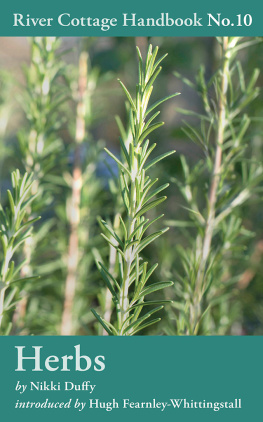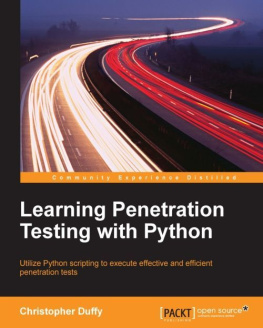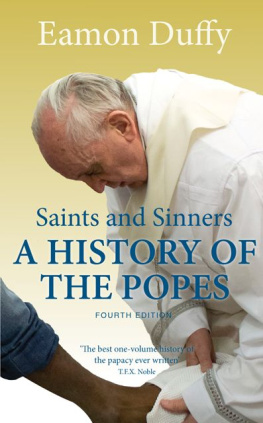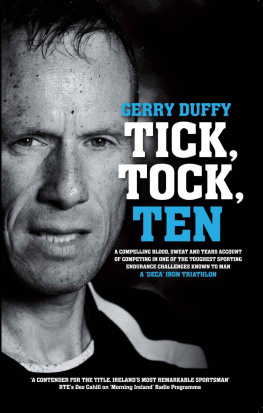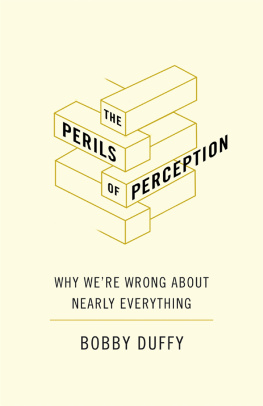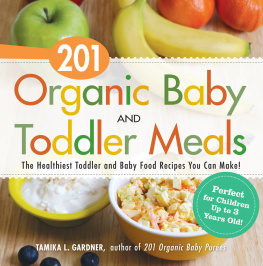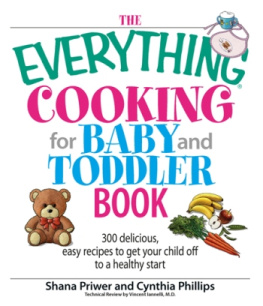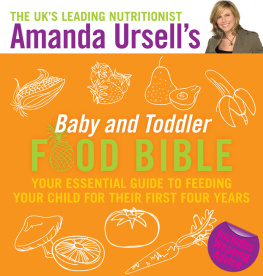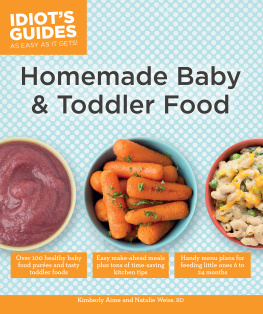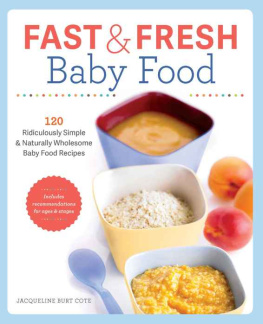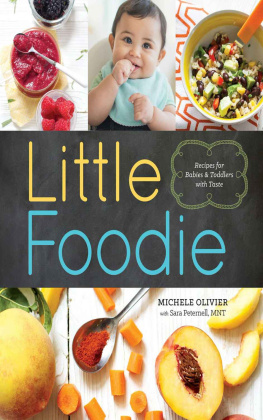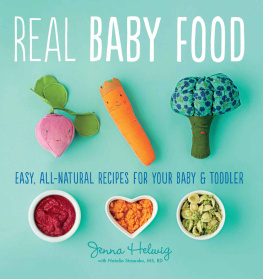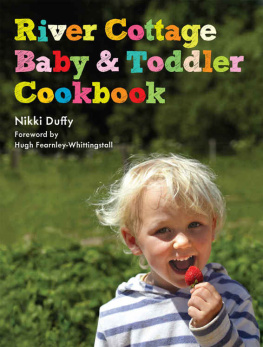

CONTENTS



F O R E W O R D
by Hugh Fearnley-Whittingstall
For more than twenty years, Ive had a consuming interest in food: where it comes from, how its grown or reared, and how it is prepared. Im as passionate about a delicious dish on a plate as the next greedy person, but Im interested in the whole story of what we eat, from first principles.
This passion took on a new focus eleven years ago when our son Oscar was born. When, at five months old, he started to take an interest in solid food, I was conscious that this was about more than just nourishment; this was the beginning of Oscars lifelong adventure with food. Of course we dabbled with baby rice, and the odd organic rusk. But we really didnt see the need to unscrew any jars. Oscar was born in early March, and his first forays into the world of solid food coincided with the late July/early August boom in the River Cottage veg garden. It was hardly a chore to mash up a bit of the veg that we were devouring ourselves and offer it up to Oscar on a spoon or a bread soldier.
So Oscar was weaned straight onto mashed carrots, bashed beetroot, creamed spinach, crushed courgettes and pured peas, shortly followed as autumn then winter came by endless variations on the multi-root mash theme, not to mention compotes of our own apples, pears and plums. Wed often give him a little of whatever we were eating too fresh fish, meaty stews, even curries provided it was of reasonably gum-friendly texture (Oscar was in no hurry to grow teeth). It was an enormous pleasure seeing him enjoying the produce Marie and I had grown ourselves, and effectively sharing our meals with us.
Early on, we tried to broaden Oscars interest in food. Marie and I took him out into the garden in his sling as we picked tomatoes or courgettes, or pulled up the carrots. Back in the kitchen he sat in his chair watching us cook, pottering about, peeling spuds, pulling something out of the oven, prodding, stirring and tasting. Not that it was intended to be a show for his benefit. We spend a lot of time in the kitchen, so where else would he be? But nonetheless we hoped that Oscar and all our children would realise from the beginning that the kitchen is an exciting place to be. Its where the action is. Its a clich to say that the kitchen is the heart of the home, but its a clich Im rather fond of repeating. Its also a playground, laboratory, mission control. Its where the good stuff happens.
Of course, its not always easy. Theres nothing quite so humbling as presenting a bowl of lovingly prepared veg to the child youve lovingly reared and seeing it used as an adornment for hair, clothes, floor and wall. Any smug feelings are soon banished as you witness the carrot stick or broccoli sprig, so popular only last week, being vociferously rejected. Its easy to say be relaxed about it, but it can sometimes be frustrating and stressful.
And thats where this book, or more precisely, Nikki Duffy comes in, dispensing encouragement, good sense, wisdom and delicious, everyday recipes. She has also, in the course of researching this book, spoken to many parents. So the advice and recipes here reflect a wide range of experiences from joyful and thrilling to maddening and completely blooming baffling.
I first met Nikki when she commissioned me to write a feature for a magazine she was working on. She impressed me with her intense interest in food and where it comes from, her knowledge and calm good humour. Eventually knowing a good thing when I see it I persuaded her to come and work with us at River Cottage. At that point shed just had her daughter Tara and she later went on to have Edie. And just recently Marie and I have added little Louisa to our brood. So during the course of our friendship, weve spent plenty of time talking about babies and children and their exciting, intriguing and, at times, perplexing journey with food.
Nikkis approach is based, as it should be, on capturing a babys natural enthusiasm and curiosity for food, but she knows thats rarely as straightforward as it sounds. So her pragmatic mixture of awareness, ingenuity (bordering on cunning) and optimistic persistence is both inspiring and trouble-shooting. With Louisa, encouraged by Nikkis brilliant chapter on weaning, we have been following a more hands-on approach (her little hands, not ours) with great success. Veering towards baby-led weaning, which Nikki explains with great clarity, we have learned to tolerate a fair degree of mess for the sheer joy of watching Louisa feed herself, with a surprising degree of competence and good judgement. Shes not a stranger to the spoon and the pure (she loves a tart apple compote) but they probably only feature once a day.
Ive read other books brimming with tactical and nutritional advice on feeding your little ones, but Nikki conveys an important message: that feeding time can give you quality family time; that sharing and openness around food, which make family mealtimes such a joy, can be introduced right from the off; that theres no real need to feed anything (except mothers milk) to your baby that you wouldnt happily eat yourself or feed to the rest of the family even if in slightly chunkier form.
Theres no hectoring here. No lectures. Just lots of hard-won information and advice. Both Nikki and I believe that good nutrition for young and not so young is not about becoming obsessed with what to avoid, so much as celebrating all of the delicious foods you can embrace enthusiastically. Im sure that her terrific recipes for everything from porridge and smoothies to soups, pts, burgers, pies, risottos and stir-fries, jellies and crumbles, will soon become favourites in your house as they have in ours. Just make sure you cook enough for everybody. And serve the youngest first.
Hugh Fearnley-Whittingstall
February 2011

I N T R O D U C T I O N
AS A PARENT, there are few things so good, so utterly satisfying as seeing your child enjoy a meal you have cooked for them. The pleasure is all the greater when you know the food youve given them is wholesome, nutritious and carefully prepared. The pursuit of this joy, the fulfilment that comes from providing well for the people you love, is at the heart of this book. More than the precise balancing of different nutrients, more than perfect presentation, more than persuading them to eat what you want them to eat, I think feeding children well should be about instilling a love of good food and of shared eating.
That, however, is not always easy. Unless youre blessed with very pliant offspring (if you consider that a blessing), you will likely, at some point, come into conflict with them where food is concerned. If not, you will probably at least have to wrestle with your own concerns over exactly what theyre eating how much of this and how much of that, how its been cooked, where its come from.
Feeding small children can sometimes be difficult, frustrating and anxiety-inducing. And no one can take that anxiety away: like so many aspects of parenting, you have to work through it yourself because no matter how many times other people tell you it will turn out all right, you never really know that it will turn out all right until it actually does. However, I hope I might be able to lessen the stress a little. Because there are lessons I have learned, and lessons learned by the many parents I have interviewed, that are worth knowing about.
Next page

